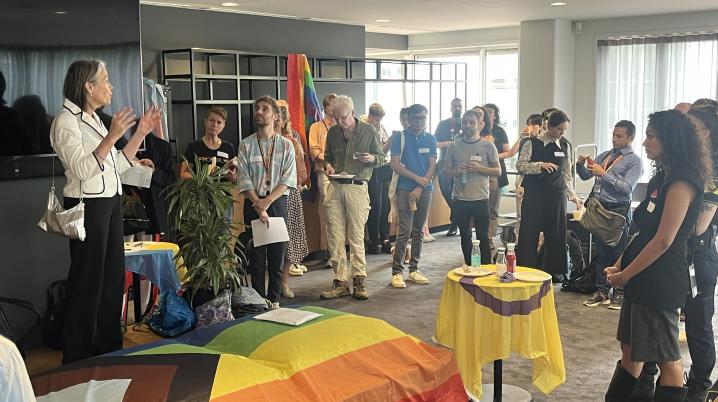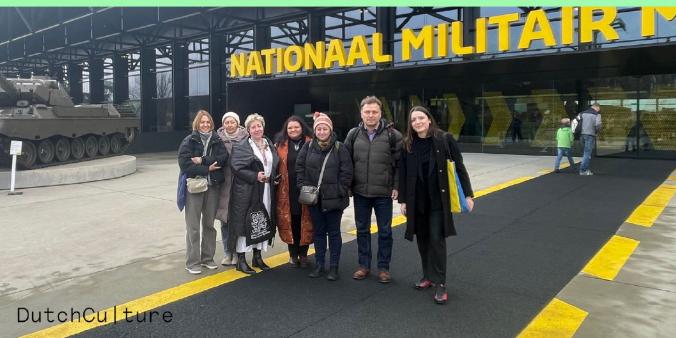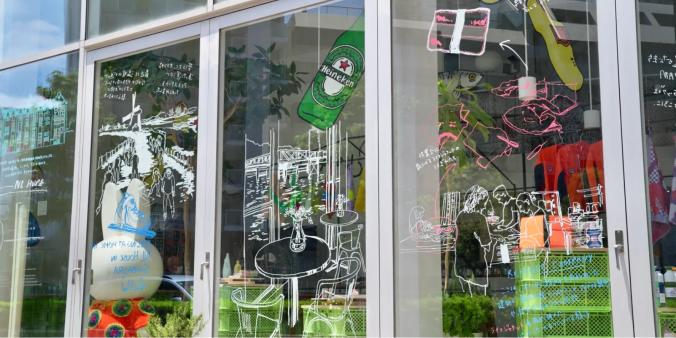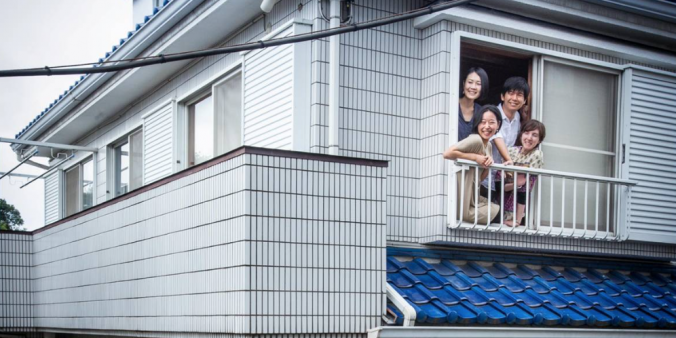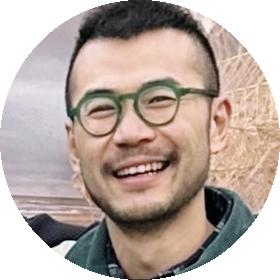
Nijiiro Diversity is a non-profit organization in Osaka, Japan, that advocates for and promotes LGBTQ+ inclusion and diversity in the workplace and society. Founded in 2013, the organization works to increase awareness of LGBTQ+ issues, provide educational resources, and support companies in creating more inclusive policies and environments. It aims to combat discrimination and create safe spaces for sexual and gender minorities in Japan, where awareness and support for LGBTQ+ rights have been historically limited. The organization's name, "Nijiiro," translates to "rainbow-coloured," symbolizing the diversity and inclusivity of its mission.
In 2022, Nijiiro Diversity set up Pride Center Osaka in the city centre. It serves as a hub for the LGBTQ+ community, offering services such as counselling, legal consultations, educational workshops, and social events. It also works to address issues like discrimination, mental health, and isolation often faced by LGBTQ+ individuals, particularly in a cultural context where being open about one's sexual orientation or gender identity can be challenging.
During this year’s Queer and Pride Amsterdam, DutchCulture joined forces with the Dutch Embassy in Japan and invited Ms Maki Muraki, founder of Nijiiro Diversity, and Mr Tomohiko Nagano, manager of Pride Center Osaka, to Amsterdam for the first time to learn about Dutch endeavours in LGBTQ+ rights over the past decades and exchange with their Dutch peers. DutchCulture introduced them to a dozen organizations, including IHLIA LGBTI Heritage, Homomonument Foundation, and De Regenboog Groep. The two visitors were kindly welcomed to the global networking events organized by COC Netherlands, Gemeente Amsterdam, and the RVO.
We sat with Ms Muraki and Mr Nagano on a summery afternoon in Amsterdam for an in-depth conversation.
Ms Muraki, what inspired you to start Nijiiro Diversity, and what goals did you have for Osaka and Japan?
"Growing up as a woman in Japan is challenging, especially for lesbians. Society expects us to be girlish, smile, and be quiet. I left my hometown at 18 and found more freedom in Osaka, which is also my partner's hometown. In 2011, I became depressed after a gay friend's suicide. I couldn't work for three months. During that time, a major earthquake struck northeast Japan, leaving me feeling isolated. I realized I wanted to change the workplace environment in Japan, where many of us can't be ourselves.
I attended a global conference on LGBTQ+ rights in London, where major companies like IBM and Accenture discussed these issues. However, no Japanese companies were involved. This motivated me to speak at Nomura Holdings, Japan's largest investment company. That was the beginning of Nijiiro Diversity—just one person at one desk."
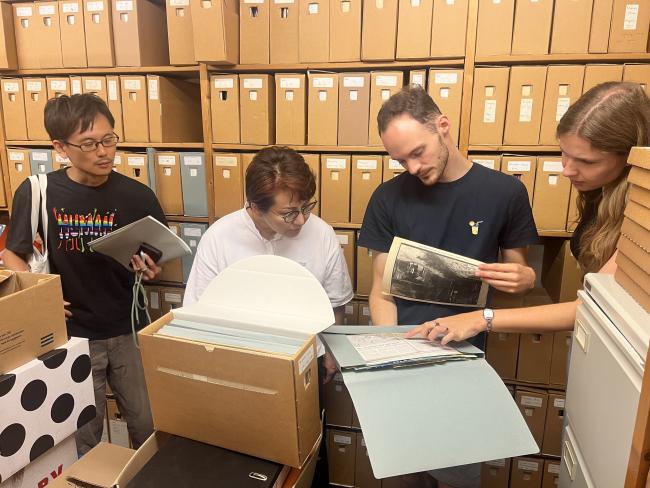
Since then, how has Nijiiro Diversity evolved, and what does it mean for the LGBTQ+ rights movement in Japan?
"Initially, I worked alone. In 2015, Tokyo's Shibuya and Setagaya wards became the first local governments in Japan to recognize same-sex relationships. This recognition spread to other local governments. We also expanded our consulting services to major companies. However, our efforts weren't enough. In 2016, my partner gave birth, and being parents without marriage status was difficult. A friend who married in the U.S. returned and sued for marriage equality in Japan. These experiences pushed me to advocate for marriage equality through our work.
During the COVID-19 pandemic, many LGBTQ+ bars closed, isolating those who hadn't come out to their families or workplaces. I realized we needed a space for community support, which was lacking in Osaka. We raised funds from large companies and established Pride Center Osaka."
Mr Nagano, how did you come to work at Pride Center Osaka?
"I previously worked at a tourism company that promoted LGBTQ+ tour routes. But the conservative atmosphere made it hard for me to come out. I wanted to change that, so I searched for opportunities and found Nijiiro Diversity and the newly established Pride Center Osaka. I saw this as a chance to be myself. It was a big challenge since I was still in the closet, but I wanted to contribute to the community. I applied to be the manager and started in 2022."
How does Pride Center Osaka connect with other projects like research and workplace consultancy?
Muraki: "All our projects are interconnected. Pride Center Osaka helps us understand how people become sick or isolated. Our workplace projects provide insight into the broader environment. We look for ways to create change. Last year, we focused on health issues and supporting the mental and social well-being of sexual and gender minorities."
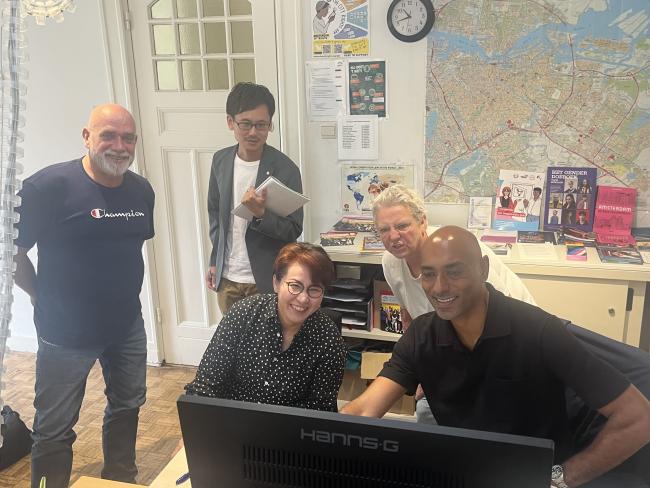
What social function does Pride Center Osaka provide?
Muraki: "At the Pride Center, people can share their experiences and discuss daily challenges, such as trans attacks and anti-gender movements. While talking about these issues won't change society overnight, it offers vital support. So far, 3,000 people have visited the Pride Center. They can write letters to politicians, and we aim to gather and deliver their voices. It's crucial for LGBTQ+ individuals to feel empowered to change society in Japan. We welcome everyone, including those who prefer not to engage in politics."
How many Pride Centers are there across Japan?
Muraki: "There are about ten Pride Centers nationwide. Most focus on health issues, like HIV prevention for gay men, and receive support from the Health Ministry for research projects. This is currently the only public funding available."
How is funding for Nijiiro Diversity?
Muraki: "Our main budget comes from companies, personal donations, and private funds. Unfortunately, there are no government subsidies to support LGBTQ+ rights. The Japanese government remains conservative in this regard. Our work is essentially social work aimed at helping marginalized people and preventing suicide. It should be supported by the government, but we still have a long way to go."
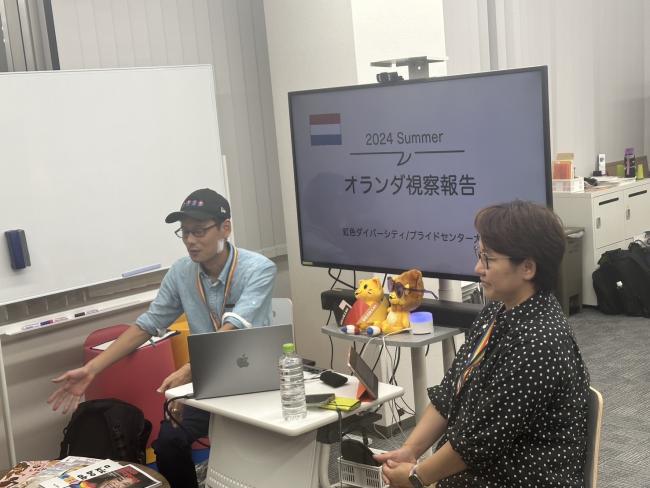
What is the current status of LGBTQ+ legislation in Japan?
Muraki: "The Netherlands was the first country to legalize same-sex marriage over 20 years ago. In Japan, conservative politicians believe that traditional family values would be threatened by such laws. They should learn from the Dutch experience, which has benefited society.
Last year, the Japanese House of Representatives passed the LGBT Understanding Promotion Act. While it sparked controversy and isn't a true anti-discrimination law, it's a small step forward. With ongoing efforts from activists, we hope the Supreme Court will legalize same-sex marriage in two years."
You also organize pride events in Osaka, inspired by Amsterdam's canal parade. What are your impressions after meeting with Dutch peers?
Muraki: "Pride events are crucial for giving visibility to LGBTQ+ people. They matter, even if they last only a few days. The reality of LGBTQ+ lives continues every day. That's why sustaining Pride Center Osaka is essential; it opens four days a week and serves as a lifeline for many.
During this trip, thanks to the Dutch Embassy and DutchCulture, we learned and gained new ideas from organizations in Amsterdam. The Netherlands is more advanced in lawmaking and public resources, but we face similar social issues, such as pinkwashing by corporations and mental health challenges."
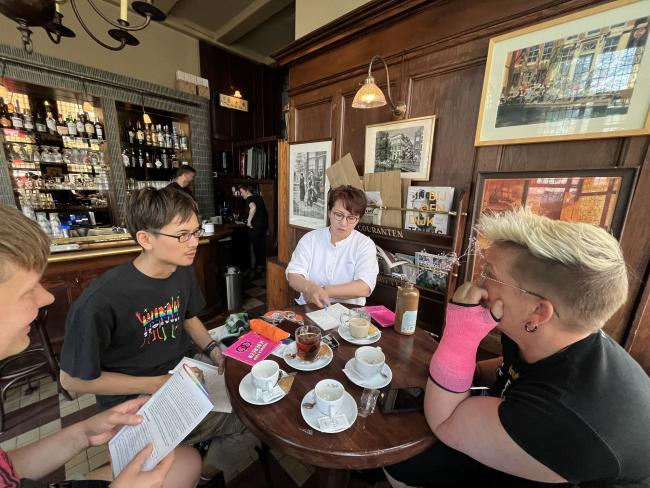
Nijiiro Diversity is involved in the upcoming World Expo in Osaka. Can you tell us more about that?
Muraki: "Our board member, Mr Arita, is part of the Working Group on Human Rights for the Expo. We are advocating against human rights violations related to LGBTQ+ individuals. Diversity is a major theme of the Expo, and we are working to include LGBTQ+-related events and exhibits. Protecting the human rights and dignity of all people is our common ground."
